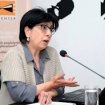“The Role of External Factors in the Karabakh Process - 2018: Mediators, Regional Actors and International Organizations”: Page 6 of 8
takes a look on the map to answer the question: “Why?” The other formats of bi- and multilateral influence are subject to the solution of individual problems or the development of individual projects that are not immediately related to the Karabakh issue.
Vyacheslav Mamedov - If we focus on alliances that have formed recently, only one of them has been very active, namely Russia - Turkey - Iran. However, this rather strange alliance was created exclusively to solve an array of issues to end the war in Syria. No more than that. That is why I am convinced that after the war in Syria ends, this alliance will fall apart. By and large, in the future when real efforts will be invested for the resolution of the Karabakh issue, other alliances we cannot yet predict the composition and the members of will be created, given the strong turbulence in international relations and the degree of uncertainty in the future relations between and among countries. The only thing to be said is that Russia will definitely be a party to these alliances.
Arman Melikyan –The Baku - Tbilisi - Ankara alliance was formed quite a while ago and has been successfully promoting joint political, economic, transportation, logistics, and military projects, among other things. The Moscow-Baku-Tehran alliance is at the formation stage and has so far predominantly focused on economy and transport. Besides, there is a special point of joint interests - the status of the Caspian. We can also speak of a certain informal alliance in the Moscow-Ankara-Tehran format which, along with issues of cooperation, considerably focuses on overcoming disagreements among its members that constantly arise in the Middle Eastern and South Caucasian space. I would qualify Baku’s success in firmly establishing itself as a key link along the East - West and North - South axes as a significant political and diplomatic achievement. This has so far granted Azerbaijan quite an ample space for political maneuvers.
On the Resources of Conflict Resolution
Andrey Areshev - It is necessary to tell the primary from the secondary; this complicates the situation, also in relation to regional conflicts, and makes the situation not quite linear. There was a time when they said that contradictions between Armenia and Azerbaijan could be partially alleviated should they both be members of the Eurasian Economic Union. However, the current state of this structure leaves no room for illusions. By the way, the EU is not in a better state and is hardly ready to assume any serious obligations in the Caucasus. The fragmentation of the post-Soviet space continues, Russia is not an exclusive player here, capable of dictating anything to anybody. In fact, this is not needed. The elites of the former Soviet republics that have escaped the “firm embraces of the Empire” are sacredly cherishing the achieved independence, and in parallel, they search for and find other partners. Some even succeed in finding protectors. It is a different issue how effective all this is, but in the case of Nagorno Karabakh I cannot see any external resources and







 +37410 563363
+37410 563363
 ул. Бузанда 1/3, 8-й этаж, Ереван, Армения
ул. Бузанда 1/3, 8-й этаж, Ереван, Армения